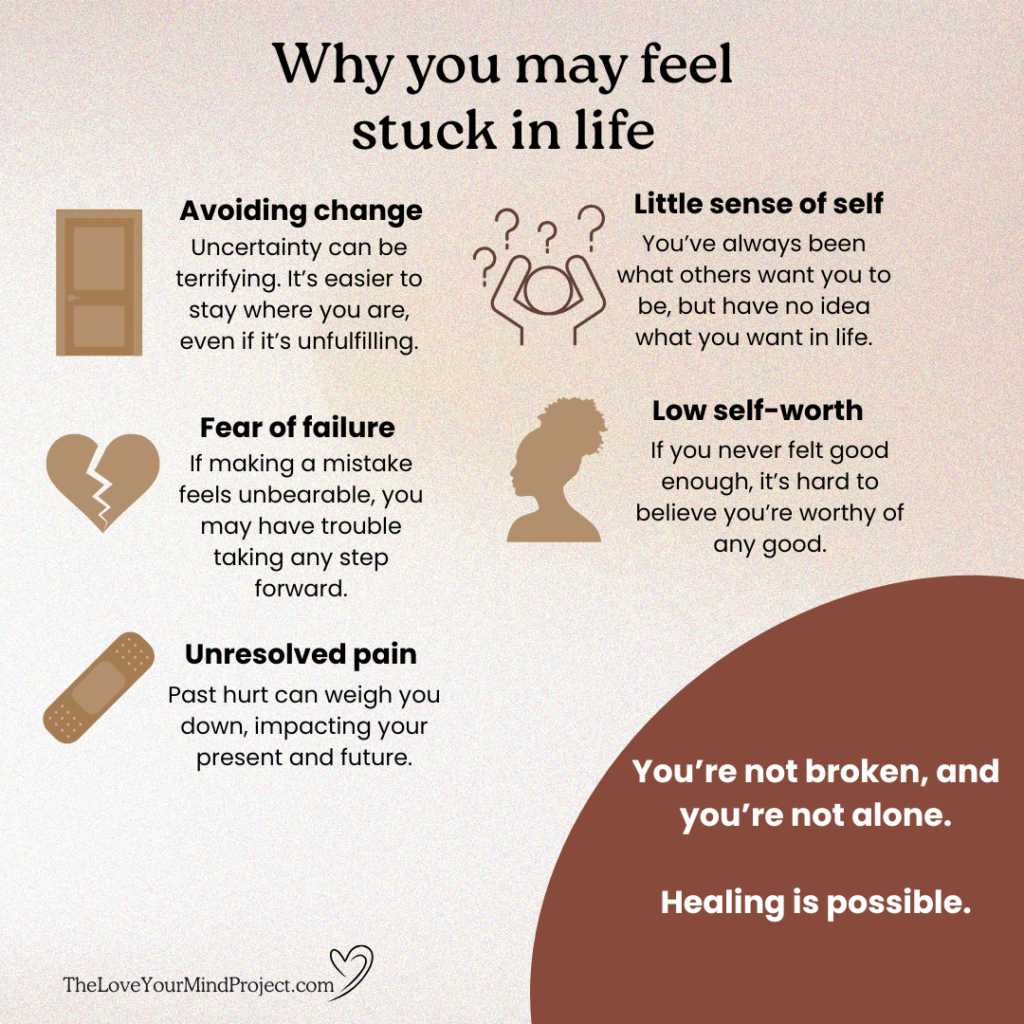- How to stop being a people pleaser—without feeling guilty - July 30, 2025
- How to heal from childhood trauma that still disrupts your life - July 23, 2025
- How to overcome fear of failure—and unlock unconditional self-love - July 17, 2025
Feeling stuck in life doesn’t have to be your norm. But to break out, you’ll need to address your mental and emotional needs.

Feeling stuck in life might sound all too familiar.
You set the goals, craft the vision board, and speak those affirmations loud and proud. Every year, you hold space for fresh hope and next level of faith.
And still, here you are, feeling trapped in the same cycle.
Whether it’s a job that drains you, a relationship that doesn’t pour back into you, or emotions that feel too heavy to carry, prioritizing your mental health can help you break out of the rut.
What's in this article?
What does it mean to feel stuck in life?
For some, feeling stuck looks like stalled progress, where no matter how hard you try, your goals feel out of reach. For others, it’s feeling lost, unsure of which path to take or where to begin. However it shows up, it can leave you drained and discouraged.
What leaves us feeling stuck?
Understanding why you feel the way you do can be a powerful step toward progress. Here are a few common reasons your life may seem stagnant.
- Avoiding change: Change can be uncomfortable or outright terrifying. But avoiding it can leave us trapped in a cycle, feeling frustrated and helpless.
- Fear of failure: The pressure to never make a mistake is inhumane and debilitating. It makes it nearly impossible to make a decision or take a risk.
- Low self-worth: When you constantly feel not good enough, it’s easy to believe you don’t deserve better. Low self-worth can have us clinging to toxic relationships or habits because we think it’s all we’re worthy of.
- Little sense of self: Living according to others’ expectations can leave us feeling lost. When you’ve never taken the time to learn your dreams, interests, and passions, you can feel trapped in a life that’s not your own.
- Unresolved pain: Unprocessed trauma, grief, or disappointment can weigh you down. It’s common to feel stuck emotionally, overwhelmed by sadness, anxiety, or even numbness.
Addressing these root causes starts with how you care for yourself — especially your mind.
What is mental health, really?
Mental health focuses on how our mind works.
Just like our physical health assesses how cells and organs function, our mental health looks at how we think, feel, and handle life’s experiences, especially the stressful ones.
The mind needs care, just like the body. Certain practices, like journaling, breathing exercises, and therapy, can support our well-being, especially when life gets overwhelming.
But here’s the thing. A lot of us still subscribe to the myths that keep us from getting the help we all need and are deserving of.

Feeling stuck in life? Let go of these mental health myths
Let’s leave these mental health myths behind to get unstuck and nurture a strong, resilient, and healed mind.
Myth 1: Black women don’t do mental health
Mental health is for everyone because we all have a mind that deserves care.
Black women endure a lot, often silently.
Our experiences with gender bias and racial discrimination alone are enough to chip away at our self-esteem and self-worth. So yes, our minds deserve care just like everyone else’s. And when we care for the mind, it gets stronger.
Imagine being aware of your emotions without judgment, being able to process, not suppress, hard experiences, and then continuing on to thrive while pulling other women up along the way.
That’s resilience.
Myth 2: Strong Black women don’t struggle
The idea that Black women must push through everything unscathed and unbothered is a lie. We’re human. That means we feel and we hurt. Subsequently, we’re allowed to heal and recover.
If you deal with sadness, anxiety, or intense stress, it’s not a sign of weakness.
Giving yourself permission to heal is true strength. It takes courage to face pain, have hard conversations, and nurture yourself back to health.
Myth 3: Having a mental health condition means you’re crazy
Mental health conditions, like anxiety, depression, ADHD, or bipolar disorder, are not character flaws. If you deal with symptoms, you’re not crazy, broken, unstable, or incapable.
Your brain is signaling a need that can be addressed.
Mental health issues are common, impacting people of all races, genders, religions, sexual identities, education levels, income levels, and more. With the right support, you can heal and thrive.
Myth 4: How you feel is your fault
It’s easy to blame yourself when you’re going through a hard season. Self-blame can be a defense mechanism, making us feel more in control than we actually are 1.
You might think, “If I had more faith,” or “If I could just be more grateful, I wouldn’t feel this way.”
But your emotions are not right or wrong. So, there’s no reason to criticize or judge yourself when you experience them. Instead, take them for what they are – signals that you need healing.
Myth 5: All mental health disorders require medication
Depending on your symptoms, conditions, and medical history, mental health medication could help you feel better. But it’s not the only path.
You can explore other paths, like therapy, community groups, and lifestyle changes. You’re in control of your mental health and never have to do anything you’re uncomfortable doing.
Still, if you find it hard to focus, eat, sleep, socialize, or care for yourself or your family, it’s worth having an honest discussion with a doctor you trust. You may find that the right prescription and dosage can change your life.
Myth 6: You can never recover from a mental disorder
Recovery can look different for everyone, but it is possible with the right help and support.
Some symptoms are shorter-term and triggered by a life phase, like post-partum depression. Others can be deeply rooted, taking more time and effort to unpack.
You can recover, and you can feel better. But you don’t need the pressure of a timeline. As you explore different tools and strategies that may help, remember that this is a journey to know and love yourself.
Myth 7: Therapy doesn’t really help with your mental health
Therapy can be a game-changer, helping you process overwhelming emotions, identify unhealthy thought patterns, and navigate life with more freedom, courage and confidence.
Talk therapy is often a great place to start, whether you feel stuck in life in general or want to address a specific problem.
FAQs
Is it normal to feel stuck in life?
Yes, it is completely normal to feel stuck. Life has seasons. Some can feel heavier, slower, or scarier than others. You’re not alone or broken. But you also don’t have to stay where you are, especially if you feel trapped more often than not.
How do you get unstuck in life?
You can start by trying to identify why you feel stuck. Whether it’s fear of failure or depression, prioritizing your mental health can get to the root of what’s stopping you from moving forward. And, in time, you can see progress.
Is feeling stuck a sign of depression?
It can be, but not always. Depression can include persistent feelings of sadness, hopelessness, and worthlessness 2 that get in the way of your daily activities. It’s common among Black women. And if you’re struggling with depression, it’s okay to get help.
If you have thoughts of suicide or harming yourself, please seek care right now. You can talk to a live, trained counselor with the Suicide and Crisis Lifeline by texting or calling 988. The call is confidential and free.
References
1 Self-Blame and Internalized Anger. (2024). Psychology Today. https://www.psychologytoday.com/us/blog/living-with-emotional-intensity/202404/self-blame-and-internalized-anger
2 What Is Depression? (2025). Psychiatry.org. https://www.psychiatry.org/patients-families/depression/what-is-depression
